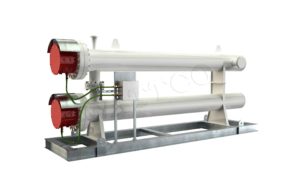4 Common Causes & Solutions of Circulation Heater Fouling
Last updated on May 15th, 2025 at 06:08 am
If you have noticed a decrease in the efficiency of your circulation heater, the most common culprit is fouling. Fouling is often accompanied by symptoms like pressure drops and inconsistent flow range. It can also cause temperatures to fall above or below the target range, using up more resources to heat or cool.
The earlier that fouling is detected the easier it is to treat. In most cases, when treated early the issues can be managed or reversed. Although, the best approach is to choose the right heating equipment and maintenance to prevent or reduce the risk of fouling from the start.
4 Common Causes & Solutions of Circulation Heater Fouling
This article takes a look at the four most common causes of circulation heater fouling, as well as how they can be resolved and/or prevented.
1. Scaling
Scaling is the buildup of minerals, commonly calcium and magnesium, on your heater or other equipment. Allowing scale to sit not only reduces the efficiency of your heater but also shortens its lifespan.
 When water is heated, dissolved salts in the fluid can crystallize on the walls, tubes, and heater becoming scale.
When water is heated, dissolved salts in the fluid can crystallize on the walls, tubes, and heater becoming scale.
The problem is particularly common in cooling towers and cold well water. Preventing this is achievable through the use of a circulation heater with a low watt density, thus reducing the element temperature.
Regular flushing is a key maintenance approach to prevent scale buildup. Performing this twice per year is generally sufficient to manage scaling. The process flushes the unit with hot water, removing any floating particles and draining the unit.
Once scaling forms, it can be treated chemically. A weak acid can break down the scale buildup without damaging the unit. Choosing the right chemicals depends on the medium and materials of your heating system.
2. Coking
Coking is a chemical reaction that occurs in oil heating processes. It is the result of the temperature and the oil residue time being higher than the oil’s stability limits. If left untreated, surfaces crack and lift, allowing more oil to become trapped causing more coking and potentially severe damage.
Material selection is an important preventative measure, avoiding materials that are easily corroded or damaged by the target medium. As well, temperatures and wattages require careful selection to stay within stability limitations.
Positive washing of surfaces is an important maintenance approach to reduce coking risks, and remove buildup. Flushing and/or power washing are both viable approaches for this purpose.
3. Sedimentation
Any sediment or debris can cause fouling in your circulation heater system. Rust, dirt, and sand are common occurrences in systems using fresh water. In most instances, small amounts of this sediment are unlikely to cause issues.
If left untreated, sedimentation builds up over time obstructing systems and affecting flow. This can cause circulation heaters to overwork, reducing their efficiency, accuracy, and lifespan. Furthermore, it can result in erosion of tubes and tanks.
Precision heat control is an important method of prevention. The use of a closed-loop circulation heater can even avoid the risk of sedimentation altogether.
If sedimentation is allowed to build, operations may need to be stopped for cleaning and/or draining.
4. Organic Growth
Organic growth is a particularly concerning issue in industries, like food and pharmaceuticals, where sanitation and hygiene are a top priority. Although, it is a major concern for any operation, as biological growth can cause severe damage, it is especially common in chemical, marine, and organic operations.
Careful material and design selection can help resist organic fouling. However, regular cleaning should be part of your maintenance plan wherever this risk is present.
Reduce Fouling Risks With Smart Circulation Heater Selection
Wattco custom manufactures electric circulation heaters to the specifics of each application. Our team will help you select the right heater types, materials, designs, wattages, and more to maximize the efficiency, value, and lifespan of your heater solution. We provide installation as well as guidance on proper care and maintenance to keep your Wattco circulation heater running better for longer.
Contact Wattco today for electric circulation heater quotes and information.


